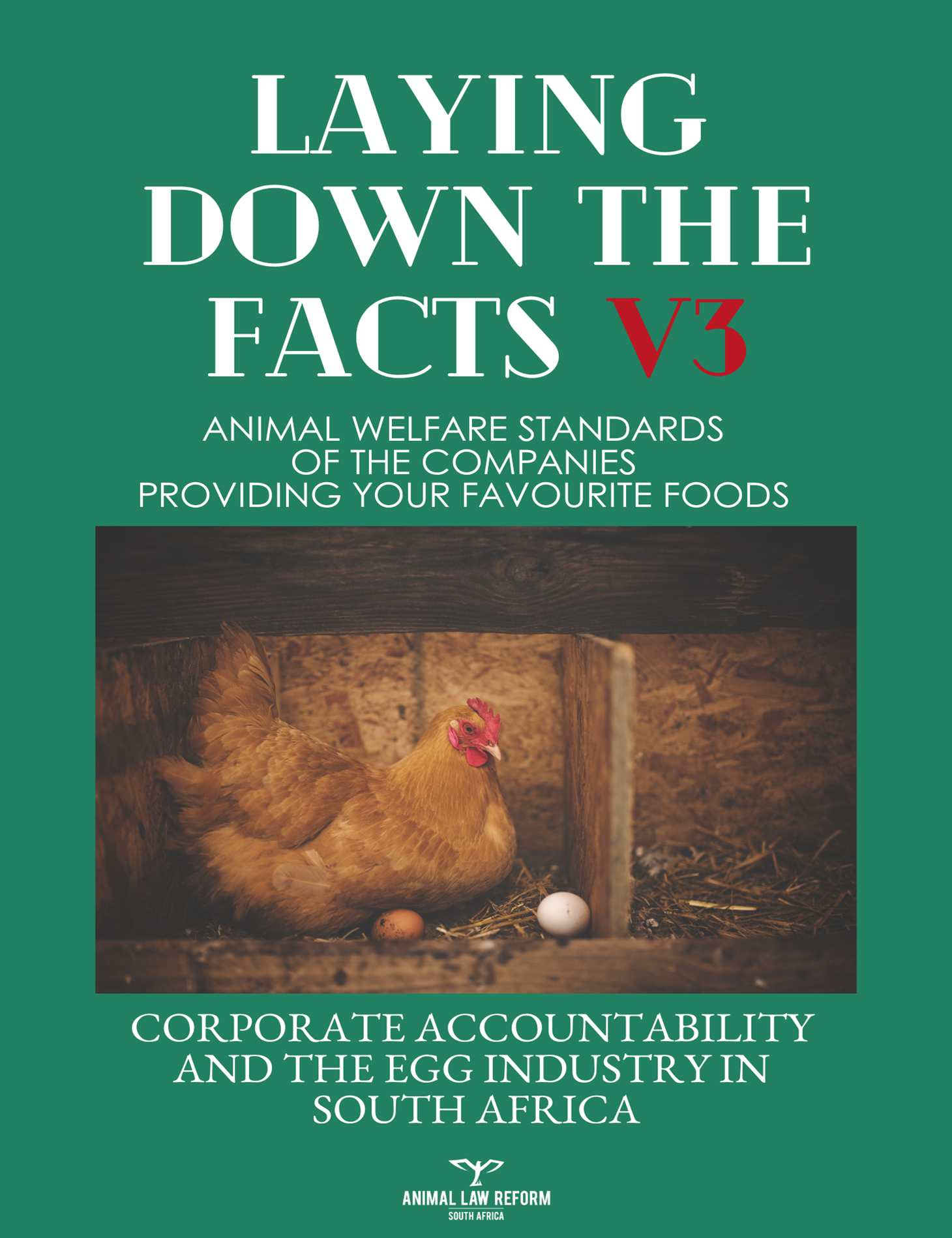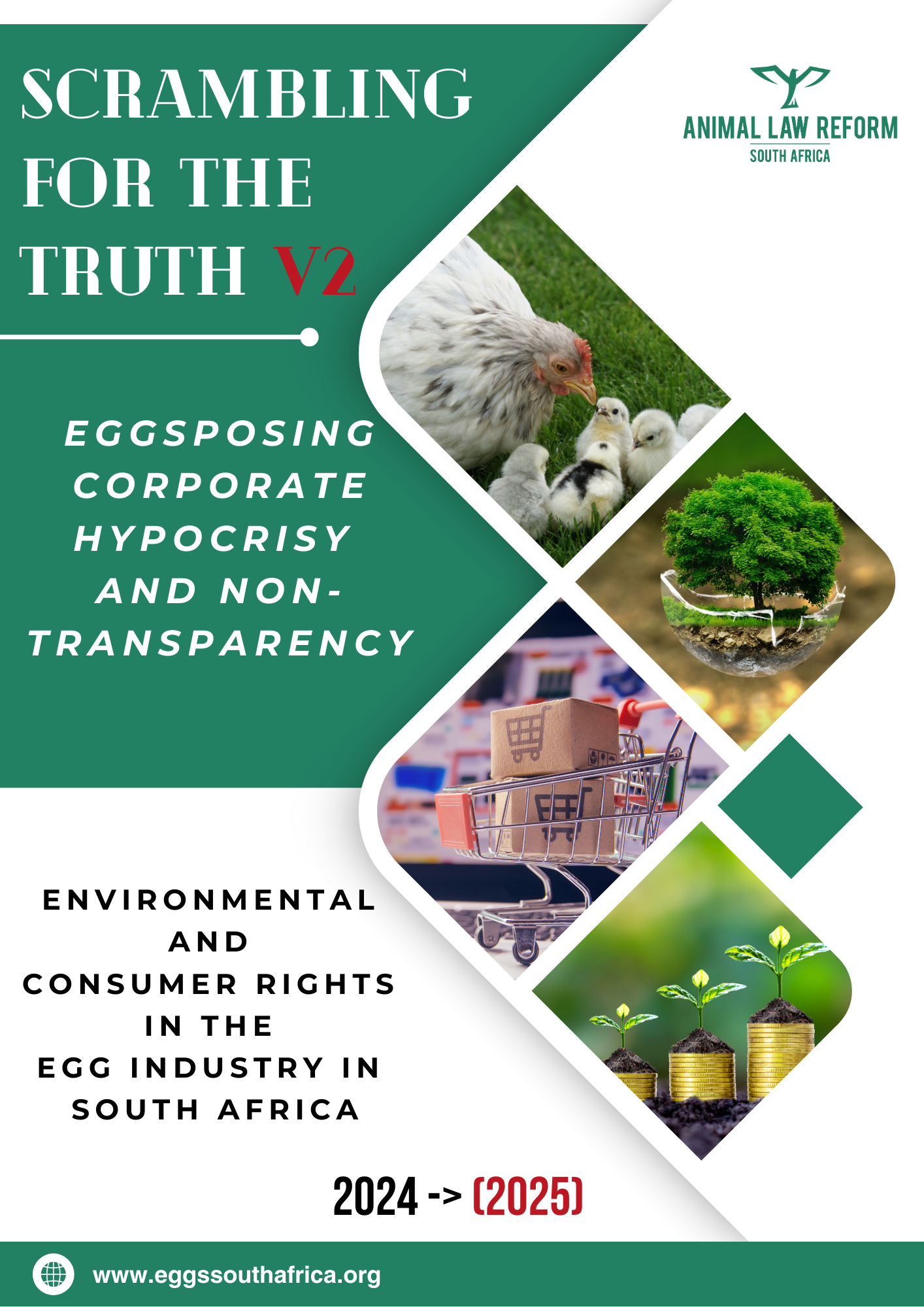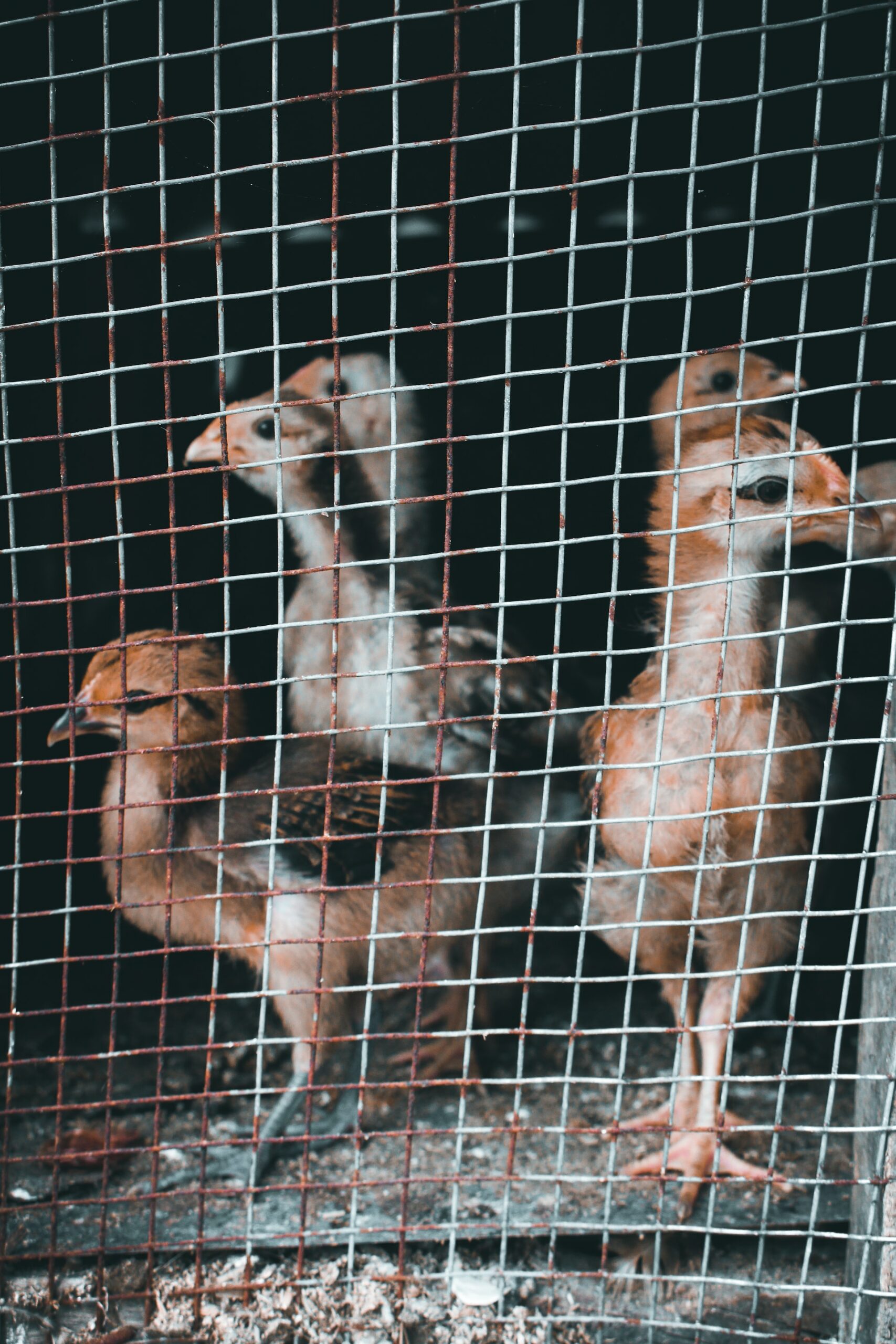
Corporate Accountability and the Egg Industry in South Africa
Updated in February 2025 (v3) with minor amendments
[*Note originally published in August 2023 (v1) and
amended in September 2024 (v2)]

Environmental and Consumer Rights in the Egg Industry in South Africa
Updated in February 2025 (v2) with minor amendments
[*Note originally published in September 2024 (v1)]

Approximately 1 billion chickens are killed every year for food in South Africa at the hands of the Poultry Industry. This number does not include the millions of Egg-Layer Hens used in the Egg Industry nor the thousands of baby male Chicks who are killed in the Egg Industry each year. In 2022, it was estimated that there were 27.40 million Egg-Laying Hens in SA. Approximately 95% of Egg-Laying Hens in South Africa are confined to live in cruel Battery Cages. South Africans consume between 150 and 159 eggs per capita, and this number is increasing.
Chickens are sentient beings worthy of human protection and consideration. They have been shown to exhibit various capacities and capabilities, including that they: have visual and spatial capacities; some understanding of numerosity; can demonstrate self-control and self-assessment; communicate in complex ways; the capacity to reason and make logical inferences; perceive time intervals and may be able to anticipate future events; behaviourally sophisticated; complex negative and positive emotions; and have distinct personalities.
In accordance with a growing international trend, consumers in South Africa reportedly care about animal welfare when purchasing food. This begs the question, how much do consumers know about the realities and impacts of their food choices, such that they can act on their caring? Further, animal welfare is but one component relevant to the production of food and consumer choices. Additional critical components include environmental impacts, food safety and health concerns, corporate and consumer practices, rights and social justice implications – which consumers may equally care about. However, consumers might not be fully aware of how these components factor into food production, let alone the scope of them. A dearth of publicly accessible and understandable information on food production, and corporate practices are part of the problem.
In South Africa, the Poultry Industry faces several challenges, including as a result of rising prices (including due to cost of feed), the current electricity crisis and associated load shedding causing huge financial losses, and major risks from highly pathogenic viruses such as the avian flu. Despite these major challenges, the South African Government aims to greatly increase and promote the consumption and use of chickens and eggs through initiatives and policies such as the “Poultry Sector Master Plan” and the “Egg Master Plan” by the Department of Agriculture, Land Reform and Rural Development (“DALRRD“) and the Department of Trade, Industry and Competition (“DTIC“).
Another major challenge in respect of the Egg Industry, is how it is governed. ALRSA takes the view that existing governance mechanisms do not adequately address the negative consequences and impacts of the Egg Industry. From an animal welfare perspective, the law does not sufficiently protect the interests of the millions of animals implicated in animal agriculture, including egg Laying Hens and their Chicks. While there are negative duties in the form of anti-cruelty laws which technically apply to farmed animals, evidence suggests that these are rarely utilised for such animals, particularly those industrialised agricultural facilities. Further, the public can do little to ensure compliance with or the enforcement of these soft laws and voluntary measures. Consequently, they do little to protect the interests of the millions of animals in the Egg Industry.
ALRSA’s Corporate Accountability Programme (“Programme“) seeks to ensure accountability of corporations for their treatment of and impact on animals. The current focus is on corporations operating within the South African egg industry (and supply chain) and their treatment of chickens, specifically, egg-laying hens in battery cages.
ALRSA is undertaking a multi-phase project to:
As at October 2025, 3 (three) separate phases have been completed. Phase 4 is currently in process.

Prior to explaining the term, it is important to understand background information about why Corporate Accountability is important and relevant.
Broadly, corporate responsibility means that Corporations are responsible for the impacts that they have on the world around them, and that they are responsible to those that their operations have an impact on. It has not only legal dimensions, but also non-legal ones, including ethical and moral responsibilities. To ALRSA, this includes responsibilities (and duties) in respect of the “Pillars” identified being animal welfare; the environment; human rights and social justice; protecting consumers; and ensuring safety and health. These responsibilities and duties expand beyond shareholders and investors, and include the public and society at large, employees, and other specific stakeholders, such as animals.
According to Professor David Bilchitz, “[t]he Constitution has established a foundation which recognises that animals and their welfare matters. That lens, bolstered by the APA read with the Criminal Procedure Act, is the basis through which we should view corporate accountability and that of its directors and employees. That, in turn, requires us to reflect on the role corporate law can play with the goal of embedding a concern with animals within the corporate structure.”
Within this constitutional context, ALRSA seeks to establish that in South Africa, it is no longer acceptable for Corporations to be motivated solely by profits. They must be motivated by protecting the interests of all who are impacted by its operations, whether they are humans or nonhumans.

Due to the vast potential impacts of the Egg Industry / Supply Chain on animal welfare, the environment, and consumer protection (among other key issues), it is imperative that Corporations are transparent about these impacts. While there are several ways to ensure accountability, we consider accountability through transparency one of the most important (Corporate Transparency).
One key manner to achieve transparency is through an outright request for documentation and records in terms of PAIA (“PAIA requests”). Whether these are forthcoming or not, Corporations have Public Statements on their websites, in their annual reports, in media, and other fora. By performing a cross-check on what a Corporation says, compared to what they do, one might determine whether or not they are being transparent, responsible, and accountable.
Efforts for increased transparency involve the inclusion of additional key role players (outside of Corporations themselves), including but not limited to key industry bodies (which often represent industry interests both formally and informally) such as the Consumer Goods Council of South Africa (“CGCSA”) and South African Poultry Association (“SAPA”), among others. Other important role players include bodies constituted to protect or adjudicate on rights and disputes such as the Information Regulator; Consumer Protection Forum (“CPF”) (part of the NCC); Competition Commission of South Africa (“CCSA”); and even government departments, tribunals and courts. This is particularly relevant and useful in instances where stakeholders are unresponsive, non-compliant, act in an obstructive and reluctant manner, or where there is otherwise a need to challenge the status quo.
Our definition of “Corporate Transparency” for our purposes refers to a particular Selected Stakeholder’s openness and willingness to disclose accurate and comprehensive information about its operations, governance, and practices. It involves providing clear and truthful communication about the Corporation’s activities, risks, and decision-making processes, promoting accountability, and building trust with shareholders, employees, customers, the public and other stakeholders.
Corporate Transparency assists with and enables consumers to make informed purchasing decisions. Of particular import is animal-related products purchased and consumed by members of the public, given the potentially harmful nature of animal agriculture. By ensuring accurate information about Corporations’ supply chains, animal welfare, environmental and Consumer Protection Measures, consumers are more empowered to support ethical businesses, encourage better corporate practices, and hold companies accountable for their actions.

